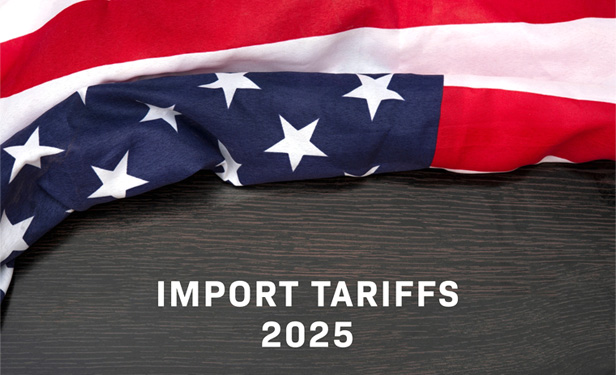News April 15, 2025
Former Duty-Free ‘Low Value’ Imports From China To Be Subject to 120% Tariff Rate
The change will impact promo suppliers and distributors. Meanwhile, there was confusion in recent days regarding how the White House will apply tariffs to key electronics products.
Key Takeaways
• Tariff Increase: Imports from China below $800 will face a 120% tariff starting May 2. Previously, thanks to the “de minimis exemption” rule, they entered the United States duty-free.
• De Minimis Exemption Removed: An executive order from President Trump is removing this tax exemption for imports from China and Hong Kong.
• Impact on Promo Industry: Higher tariffs stand to increase importing costs, making products more expensive to bring stateside.
Imports from China that have been allowed to enter the United States tariff-free due to being below a certain value threshold will now be subject to a tariff rate of 120% starting May 2, according to federal authorities.
President Donald Trump has signed an executive order that removes the de minimis tax exemption for imports coming from China and Hong Kong. The importing loophole had allowed overseas shipments valued at less than $800 per person per day to enter the United States free of tariffs.

China-based ecommerce sellers like Temu and Shein had used the exemption to sell huge quantities of low-cost goods directly to American consumers. Both suppliers and distributors in the promotional products industry have benefitted from the exemption too, using it to bring product stateside tariff-free.
In an April 2 executive order, Trump initially decided to subject imports that had previously been eligible for the de minimis exemption to ad valorem duties of 30% (in place of any other duties), plus $25 per postal item starting on May 2. He then hiked the rate to 90%.
Now, however, Trump is upping the rate again – this time to 120% on those goods. Such imports will also be subject to a “per postal item” cost of $100 starting May 2, which goes up to $200 on June 1.
$1.36 Billion
Value of imported shipments claiming the de minimis exception in fiscal year 2024.(U.S. Customs and Border Protection)
If implemented as indicated, the rates will make importing more expensive for promo suppliers and distributors – and other importers – on orders in which they would have previously been able to apply the de minimis exemption.
Tom Goos, president and CEO of Counselor Best Place to Work distributor Image Source (asi/230121), said the de minimis exemption removal on China-made projects affects his firm and others in the industry that have relied upon it. “It does impact our business as we have a few significant programs where we bring in hundreds of small orders a month under the de minimis exemption,” he told ASI Media.
Still, he acknowledged that higher-volume importers in promo and other markets may favor the exemption getting the kibosh. “I have heard from a few suppliers that support the (de minimis) tariffs, as they feel the inequity based on bringing in larger orders that have tariffs included,” Goos said.
Chris Babiash, president/CEO of distributor Booshie Inc., said the de minimis exemption going away will have a definite impact on the business. “A majority of (our) orders coming out of China are team or project-based and 90% of them are under $800,” Babiash told ASI Media. “It will force me to look at alternatives outside of China…but we will never be able to pull all of our eggs of that basket.”
Confusion on Electronics Tariffs
The Trump administration has imposed a 145% rate in additional tariffs on China-made imports so far in 2025. The administration has also announced baseline tariffs of 10% on all imports.
Among other tariff moves, Trump has paused so-called reciprocal tariffs – specific levies for particular countries around the globe that his administration tailored to counteract what he described as tariffs and other trade barriers such nations place on the United States.
Confused and/or concerned about #tariffs and the #promoproducts industry? This webinar from ASI can help orient you.
— Chris Ruvo (@ChrisR_ASI) April 9, 2025
Nearly 1,000 Tune Into ASI Tariff Webinar Featuring Expert Panelists https://t.co/RBriZgbFtn
Meanwhile, there were mixed signals from the Trump administration over the weekend regarding tariffs on electronics. A notice from U.S. Customs and Border Protection appeared, in the estimation of some, to indicate that technology products like smartphones, computers, memory chips and other tech product categories were exempt from the 145% tariffs on Chinese goods.
Trump then said electronics would still face tariffs. Writing on social media, the president said: “NOBODY is getting ‘off the hook’ for the unfair Trade Balances, and Non Monetary Tariff Barriers, that other Countries have used against us, especially not China which, by far, treats us the worst!”
He continued: “There was no Tariff ‘exception’ announced on Friday. These products are subject to the existing 20% Fentanyl Tariffs, and they are just moving to a different Tariff ‘bucket.’”
U.S. Commerce Secretary Howard Lutnick later tried to clarify by stating that electronics are “exempt from the reciprocal tariffs, but they’re included in the semiconductor tariffs, which are coming in probably a month or two.”
Higher tariffs are affecting the promo industry through increased costs that are compelling companies to alter product pricing and sourcing practices, among other impacts. Price hikes, sales declines and margin pressures are in the cards. The tariffs are also driving increased interest in Made-in-USA products.
